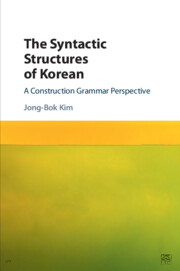Book contents
- Frontmatter
- Contents
- Acknowledgments
- Abbreviations
- 1 Theoretical foundations
- 2 Noun phrases
- 3 Case system
- 4 Auxiliary and complex predicate constructions
- 5 Gerund phrases and mixed categories
- 6 Verbal nouns and light verb constructions
- 7 Serial verb constructions
- 8 Negation and related phenomena
- 9 Coordination
- 10 Passive constructions
- 11 Wh-questions
- 12 Topic and focus constructions
- 13 Relative clause constructions
- 14 Honorification
- References
- Index
12 - Topic and focus constructions
Published online by Cambridge University Press: 05 July 2016
- Frontmatter
- Contents
- Acknowledgments
- Abbreviations
- 1 Theoretical foundations
- 2 Noun phrases
- 3 Case system
- 4 Auxiliary and complex predicate constructions
- 5 Gerund phrases and mixed categories
- 6 Verbal nouns and light verb constructions
- 7 Serial verb constructions
- 8 Negation and related phenomena
- 9 Coordination
- 10 Passive constructions
- 11 Wh-questions
- 12 Topic and focus constructions
- 13 Relative clause constructions
- 14 Honorification
- References
- Index
Summary
Korean is often called a “topic-prominent language” in the sense that it organizes its syntax to emphasize topic–comment structures. Topic expresses what the given sentence is about while comment is what is being said about the topic. Part of the comment structure includes “focus,” representing new information. This chapter identifies several different types of topic and focus constructions and discusses their grammatical properties. It then offers a construction-based analysis that can in a simple manner state the shared properties among a family of related constructions.
Topic constructions
Basic properties
Topic constructions, representing what the sentence is about, are typically marked by the sentence-initial expression with the marker -(n)un. Consider the following pair:
a. ai-tul-i pomwul-ul chac-ass-ta
child-PL-NOM treasure-ACC find-PST-DECL
‘The children found the treasure.’
b. ku pomwul-un [ai-tul-i _chac-ass-ta]
the treasure-TOP child-PL-NOM find-PST-DECL
‘As for the treasure, the children found it.’
The sentence (1a) has canonical word order, while (1b) topicalizes the object from the underlined position. The topic expression prompts a definite interpretation, and the referent of the topic is thus familiar in discourse.
Note that not only an argument (subject or object) but also an adverbial expression can be topicalized:
(2) a. onul-un nalssi-ka cham coh-ta
today-TOP weather-NOM very good-DECL
‘As for today, the weather is really good.’
b. i tosi-nun ankay-ka manhi kki-n-ta
this city-TOP fog-NOM much rise-PRES-DECL
‘As for this city, the fog rises a lot.’
In these examples, the adverbial expressions onul ‘today’ and i tosi ‘this city’ function as the topic in the sentences, describing what is being talked about.
In addition, there is another type in which the topic of a given sentence is a nominal expression not functioning as an argument of the sentence in question.
(3) a. kkoch-un cangmi-ka alumtap-ta
flowers-TOP rose-NOM pretty-DECL
‘As for flowers, roses are pretty.’
b. sayngsen-un kotunge-ka masiss-ta
fish-TOP mackerel-NOM tasty-DECL
‘As for fish, mackerel is tasty.’
In these examples, kkoch-un ‘flowers-TOP’ and sayngsen-un ‘fish-TOP’ are neither an argument of the matrix verb nor an adjunct expression themselves. The sentences headed by pure intransitive verbs here are fully saturated ones even without these topicalized expressions. The grammatical functions of the topicmarked nominals are thus rather “adverbial,” giving an interpretation like “as for flowers” or “as for fish.”
- Type
- Chapter
- Information
- The Syntactic Structures of KoreanA Construction Grammar Perspective, pp. 256 - 282Publisher: Cambridge University PressPrint publication year: 2016



